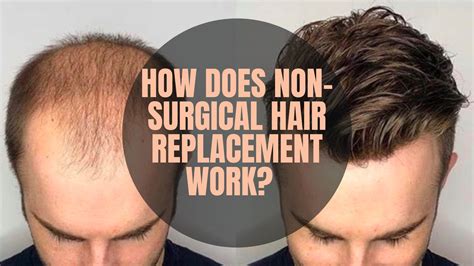If you’re experiencing hair loss, it’s natural to feel concerned. But surgery shouldn’t be your first thought. There are a wide range of non-surgical hair replacement options available today that can help you regain your confidence.

- Cost-effective: Non-surgical hair replacement is typically less expensive than surgery.
- Non-invasive: No need for scalpels or incisions.
- Reversible: You can remove the hairpiece or wig if you change your mind.
- Versatile: Choose from a variety of colors, styles, and textures to match your natural hair.
1. Hairpieces
- Attaches to existing hair with clips or tape
- Available in a variety of sizes and colors to blend seamlessly with natural hair
2. Wigs
- Cover the entire head, providing instant volume and coverage
- Made from synthetic or human hair, offering customizable style options
3. Toppers
- Small hairpieces that add volume to the crown or thinning areas
- Can be clipped or sewn in for a secure fit
4. Hair Extensions
- Strands of artificial or human hair that are bonded to your natural hair
- Offer length, volume, or color enhancements
5. Microlinking
- Attaches hair strands to existing hair using tiny, invisible links
- Provides a natural-looking result with minimal damage
6. Weaving
- Braids your natural hair into cornrows and attaches hair extensions to the braids
7. Afro Kinky Twist
- Creates natural-looking, curly hair extensions using synthetic hair strands
- Blends seamlessly with African-American hair textures
8. Taped Hair Extensions
- Uses adhesive tape to bond hair extensions to your natural hair
- Quick and easy to apply, offering versatility and flexibility
9. Keratin Bonding
- Attaches hair extensions using keratin-based glue
- Provides a strong and long-lasting hold
10. Lace Wigs
- Thin, lace-based wigs that provide a realistic scalp-like appearance
- Offer breathable and comfortable wear
11. Frontals
- Lace-based hairpieces that cover only the front hairline
- Allow you to create a variety of styles, including updos and braids
12. Ponytail Extensions
- Temporary hairpieces that attach to your natural hair using a clip or bungee
- Offer instant volume and length for special occasions
The best non-surgical hair replacement method depends on your individual needs and preferences. Consider factors such as:
- Desired length and volume
- Hair texture and color
- Budget
- Lifestyle and maintenance requirements
1. Consultation: Schedule a consultation with a hair loss specialist or stylist to discuss your options.
2. Measurement and Fitting: Determine the size, color, and style of your chosen hairpiece or extension.
3. Attachment: The professional will attach the hairpiece or extension to your natural hair using the appropriate method.
Non-surgical hair replacement requires regular maintenance to keep it looking its best. This includes:
- Washing and conditioning
- Brushing and styling
- Removal and reattachment as needed
- Is non-surgical hair replacement noticeable? With proper fitting and maintenance, non-surgical hair replacement options can be virtually undetectable.
- How long does non-surgical hair replacement last? The lifespan varies depending on the method used. Wigs typically last 4-6 months, while hair extensions can last 3-6 months.
- Can I style non-surgical hair replacement? Yes, you can style most non-surgical hair replacement options just like your natural hair.
- Is non-surgical hair replacement harmful to my natural hair? When performed by a professional, non-surgical hair replacement should not damage your natural hair.
- How much does non-surgical hair replacement cost? The cost varies widely depending on the method chosen and the quality of the hairpiece or extension.
Non-surgical hair replacement offers a range of solutions to address hair loss and restore confidence. With careful consideration and professional guidance, you can find the perfect method to suit your needs, budget, and lifestyle.
Synthetic vs. Human Hair: Synthetic hair extensions are generally more affordable and easier to maintain, while human hair extensions offer a more natural look and feel.
“Frustration Patch”: A small area of non-surgical hair replacement that can be hidden under existing hair to conceal a thinning spot or patch of hair loss.
Table 1: Hair Replacement Options and Suitability
| Method | Length | Volume | Color Match | Damage Potential |
|---|---|---|---|---|
| Hairpieces | Short to Long | Low to High | Good | Minimal |
| Wigs | Short to Long | High | Perfect | None |
| Toppers | Short to Medium | Low to Medium | Good | Minimal |
| Hair Extensions | Short to Long | Low to High | Customizable | Some |
Table 2: Average Lifespan of Non-Surgical Hair Replacement Methods
| Method | Lifespan |
|---|---|
| Wigs | 4-6 months |
| Hair Extensions | 3-6 months |
| Microlinking | 3-6 months |
| Weaving | 4-8 months |
| Keratin Bonding | 4-6 months |
| Lace Wigs | 6-8 months |
Table 3: Non-Surgical Hair Replacement Costs
| Method | Cost Range |
|---|---|
| Hairpieces | $50-$500 |
| Wigs | $100-$2,000 |
| Toppers | $50-$250 |
| Hair Extensions | $100-$1,000 |
Table 4: Maintenance Tips for Non-Surgical Hair Replacement
| Maintenance Task | Frequency |
|---|---|
| Washing | 1-2 times per week |
| Conditioning | 1-2 times per week |
| Brushing | Daily |
| Styling | As desired |
| Removal and Reattachment | As needed (typically every few months) |
